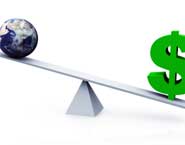The study by researchers from the Universities of Bristol and Cambridge investigated a range of GDP growth rates from 2008 to 2100 to see what effect they have on the mean Social Cost of CO2 (SCCO2) for a range of economic scenarios. Using data from integrated assessment model, PAGE09 — designed to help policy makers understand the costs of climate change — the researchers calculated the cost of emitting an extra tonne of carbon dioxide today.
The results show the damage caused by emitting an additional tonne of carbon dioxide today is $107, assuming economic growth of around two per cent per year. The cost if economies continue to stagnate is $138 per tonne, however. The mean social cost of CO2 increases when economic growth is slow because the worst climate impacts occur in a relatively poor world. The results imply that the European carbon price is currently around $100 too low.
Mat Hope, a researcher from Bristol’s School of Sociology, Politics and International Studies, said: “In economically tough times, governments' attention tends to shift away from the issue of climate change. Governments are abandoning climate action as they focus on reviving their economies. But our results show economic stagnation is no excuse for climate inaction. The carbon price should actually be higher if slow economic growth continues.”
Media coverage
The research was covered by the Guardian [12 July 2013].
